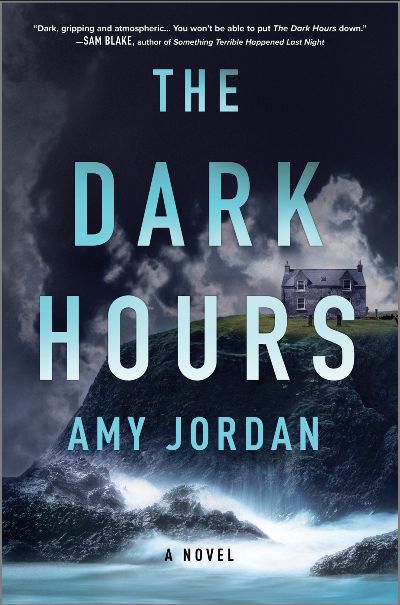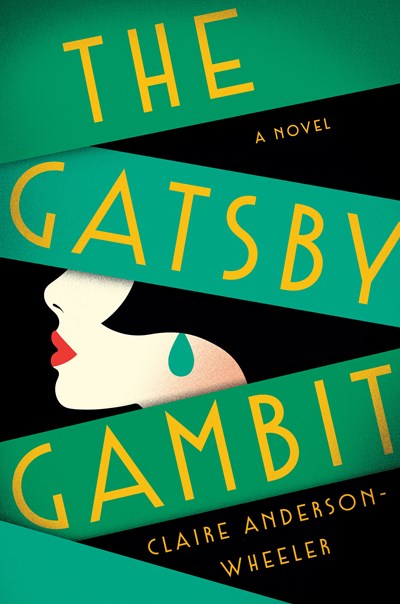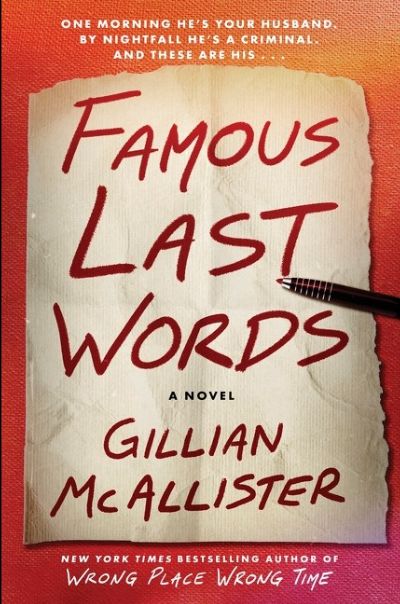In his 2013 James Bond novel, Solo, Boyd sent the iconic secret agent to 1969 Nigeria. While the protagonist of his new book shares Bond’s love of good liquor and beautiful women, he is a reluctant spy, and the author here is interested in exploring the morally murky world of Cold War espionage, double dealings, political murders, and defections. It is August 1960, and British travel writer Gabriel Dax is interviewing Patrice Lumumba, the Prime Minister of the newly independent Republic of the Congo. Lumumba, who insists the interview be recorded, mentions that certain foreign powers aim to assassinate him. On the flight back to London, Gabriel notices an attractive older woman reading one of his travel books. Other odd incidents occur. Gabriel’s editor cancels the Lumumba piece and demands his notes and tapes, which is not standard journalistic practice. Instead, Gabriel buries the tapes in his garden. The woman on the plane, Faith Green, turns up at Gabriel’s door and asks him to do “small favors” for MI6, similar to the ones he does for his elder brother, Sefton, in the Foreign Office. Gabriel initially refuses but falls under Faith’s seductive spell and embarks on his first assignment in Spain. The writer is soon caught in a twisty labyrinth of lies and betrayals, and, like Michael Corleone in Godfather, Part III, gets pulled back into the spy game each time he tries to extricate himself from the manipulative Faith’s machinations. At the same time, Gabriel struggles to understand, through analysis, the childhood trauma—his mother’s death in a fire—that has scarred his life. This first-rate complex and suspenseful historical thriller will resonate with fans of John le Carré and Alan Furst.
Review
Julia Harte, retired from the Irish police, has effectively hidden herself away from her infamous past in a sleepy village. As a young Garda, she was instrumental in solving the most notorious serial-killer case of the day, with both emotional and physical scars to show for it. After her successful police career, she writes what is intended to be a textbook for police training, only to have it become a bestseller for true-crime aficionados. Thirty years later and days after Cox, the serial killer, dies of natural causes, there is another frighteningly identical killing, drawing Julia and her former mentor into the case as consultants. The author artfully intertwines the stories from the past and present, creating a palpable sense of dread and foreboding. While we know Julia solved the past crime, we don’t know how. The gradual revelation of the past informs the solutions of the present, and while the situation is similar, Julia is not the raw beginner she once was. The characters are well drawn, the landscape is integral to the telling, and while this is a debut novel, it doesn’t read like a practice run.
Some jobs are more permanent than others, such as working for Russia’s GRU, or secret service. Greg Abimbola, real name Grigoriy Adamovich Petrov, has left the organization and now lives a traitorous life, according to his old colleagues, in Pittsburgh. There he teaches Russian and French at a prestigious school, masquerading as a quiet British man who’s content to help students with grammar and teenage issues. Greg is mixed race, his father Black and mother white, so being an outsider is a well-worn path for him, and he’s thriving in his new life. Until, that is, GRU wants his help—and they never ask nicely. A man has been found dead in Pittsburgh, with signs that he’s Russian, possibly a man that GRU has been after, and they want to know who’s responsible. Greg then becomes a kind of double agent, as a contact he has in the Pittsburg police since he helped solve a murder (in the series debut, A Quiet Teacher, 2022) also wants his help with the mystery of the dead maybe-Russian. And then a second death, labeled a suicide but maybe a murder related to a proposed and hotly debated Diversity, Equity, and Inclusion program at another local school, sees Greg also investigating. There’s no need to read the first book to enjoy this one, but readers will undoubtedly want more from this lovable teacher who brings his spy smarts to every encounter but knows enough to conceal them when necessary—and when to drop the facade to perfect effect. The ending here is—what’s the Russian for chef’s kiss? Get this on your list!
It takes a lot of guts to write a book based on one of America’s most beloved novels, one that’s the inspiration for several major films and is assigned reading in high schools across the country: Fitzgerald’s The Great Gatsby. But Wheeler successfully takes the original setting, Jay Gatsby’s mansion in West Egg during the summer, and the same cast of characters (Gatsby, Daisy and Tom Buchanan, Nick Carraway, Jordan Baker) and shifts the narrative into a work of crime fiction. The biggest surprise is the arrival of Greta Gatsby, Jay’s much younger sister. Greta is finally done with finishing schools, has moved into Jay’s mansion, and is ready to take on the world. But the suicide—or was it murder?—of one of the leading characters, and the response of most of the residents (one more Gimlet, please?) inspires Greta to become a sleuth, if no one else will. Greta’s new role is hardly acceptable for a young lady, but she just barrels through the criticism, investigating the household staff, the cops, even Gatsby’s guests. A fresh and exciting take on America during the roaring ‘20s, with feminism and class tensions taking center stage, and sure to be a pleasure for readers who enjoy historical mysteries. It would be a delight to have Greta return in all her nosy glory
The world of amateur true-crime investigators—and what a populous world it seems to be!—is given its own investigation in Winstead’s (Midnight is the Darkest Hour, 2023) latest, with the author using murders at a sorority house to show who benefits from and who’s destroyed by the trend of podcasters as police. Readers enter through the screen of Janeway Sharp (Star Trek fandom plays a big role here), the youngest of a group that calls itself the Real Crime Network. She’s drawn to the work after the sudden death of her beloved father and grows an obsession with true crime even though she feels it is wrong. In the Network, she finds forgiving and encouraging brethren who are only too happy to accompany her into the frightening details surrounding the murder of three sorority sisters who were stabbed and left in a bloodbath. Jane, now called Searcher, and her companions can’t stay away from the college town in question, Delphine, Idaho. Readers are taken to new viewpoints along with them, meeting the families in question, the townspeople who are suddenly besieged by murder groupies, and the police and FBI, who are willing to take the help when the Network starts to be successful. Suspects, twists, and danger add to the media-cult side of the tale, adding up to a smart whodunit with a side of contemplation.
An expert novel of incredible suspense. A moving love story. And certain to be one of the best books of 2025. Camilla (Cam) wakes up early one morning only to find that her husband, Luke, has disappeared, he’s left a rather ambiguous note, and no amount of telephoning or texting is bringing him back. But enough about him. This is also Cam’s first day back from maternity leave and their nine-month-old daughter’s first day at nursery. Enough anxiety? Well, there’s more. Cam is just getting settled into her publishing job when she sees footage of a hostage situation in Central London. Then the cops arrive at her office, wanting her to identify herself. Luke’s being held hostage? Horrifying. But no, actually. He’s the hostage taker. Now don’t think I’m giving away the plot, this is just the beginning of a story that spreads out over years, confronting how you can love a spouse whom the world believes is a criminal. Who manages to disappear for years after killing two of the hostages, but never manages to contact you. A man who you think you know, but can’t help and wonder if your relationship was built entirely on lies. But hang in there. The resolution—when it does come—is as shocking as it is gratifying. By the author of the Reese’s Book Club Pick Wrong Place Wrong Time.
One of the best—and most shocking—narratives of revenge I’ve ever encountered, and one that even saves room for a bit of humor. Cyra’s younger sister Mira has been murdered, apparently by a serial killer. It’s been over a month, and Cyra has grown increasingly frustrated at the tepid response from the New York Police Department: “Let us do our jobs.” Since Mira died, nearly everything—Cyra’s job, her relationship with her ex-girlfriend, the small group of friends she and Mira share, her apartment in Queens—is rapidly unraveling. Big sister Cyra has always taken care of Mira, and if she couldn’t stop Mira from being murdered, at least she can find her murderer. With some help from a friend, Cyra learns about a self-help group for serial killers—kind of funny, kind of not—and successfully infiltrates the group, creating a persona as a murderer. She claims to work in a nursing home, preying on the elderly, and manages to convince the guys (yes, it’s an all boy’s club) to let her join their group. Her goal? To learn if any of the members murdered Mira, or at least knows who did. But creating an identity as a serial killer has its own unanticipated consequences, and the more involved Cyra becomes in the support group, the more she finds her old self slipping away. Schaefer’s story is dark and twisted, unique, and totally engrossing. Readers who enjoy this book may also appreciate Oyinkan Braithwaite’s My Sister, the Serial Killer and Peter Swanson’s A Talent for Murder.
Though she works at her parent’s bridal shop, Rosie hasn’t floated down the aisle in a white dress herself. Not that she doesn’t own one: she’s recovering from the heartbreak of getting as far as buying her dream creation, only to be rejected. It’s been a tough time emotionally and physically since Brad became the latest man to find Rosie “just too much.” She’s even had a heart transplant, and joins DonorConnect, a service that allows her to write anonymously to Morgan, the husband of Daphne, the woman whose accidental death saved Rosie’s life. Their discussions quickly—alarmingly so—become deep and revealing, and confirming her “too much” reputation, we soon see Rosie bumping into famous-author Morgan oh-so-accidentally in a cafe. At the same time, readers are getting hints that Morgan might not be as wonderful as Rosie at first thought. Combine a possibly unreliable narrator with a wow twist and side characters with shady motivations and you’ve got Collins’s compelling latest. One for Gillian Flynn’s many fans.
Camping with her crunchy-granola parents, nit-picky sisters, and assorted also-exhausting family members is Remi Finch’s idea of torture. But it’s her parent’s 40th wedding anniversary and they plan to renew their vows, so fine. She can put up with these people for a few days, especially when she sees that a handsome park ranger is part of the package. Also part of it, though, is Guy, the loathsome son of family friends, who when he was younger held Remi underwater so long she thought she’d drown. Grandma’s reaction, “even when I could still taste chlorine in the back of my throat,” was that horrible Guy obviously had a crush on her. So she’s not expecting much assistance when she finds herself in danger on the trip, a prediction that comes both true and not, as her family steps up but sometimes doesn’t know when to stop. Readers will find the Finches both a lovable and a very real family, with affection and exasperation battling for top spot in Remi’s feelings for them. The story dips into cozy territory, with the law-enforcement love interest, the off-screen killing, and the slapstick family antics, enriching a puzzling whodunit in the process. A great choice for cozy fans who enjoy a wilderness element.
Arsonists attacking a homeless encampment sparks an investigation into the highest levels of city government in L’Etoile’s follow-up to Face of Greed. Detective Emily Hunter and her partner, Javier Medina, are called to the scene of one of the fires, and they quickly learn why when the dead body of the former mayor of Sacramento is found in the wreckage. A little girl whose mother got caught in the fire and hospitalized appears to be a witness. Emily feels protective of the little girl, and when she discovers that other homeless camps have been torched and the former mayor was dead before the fire even started, she realizes that the child might have a target on her back. L’Etoile juggles excellent, highly realistic characters with a terrific crime story that feels like the best of Michael Connelly. Readers will anxiously turn the pages while they are confronted with complex issues in the real world, such as how to compassionately help people experiencing homelessness and the trauma of trying to assist elderly parents who have Alzheimer’s. It’s unnecessary to read Face of Greed first to enjoy this novel, and to be honest, River of Lies is even better. With all the award nominations Face of Greed received, expect even more for this one.










